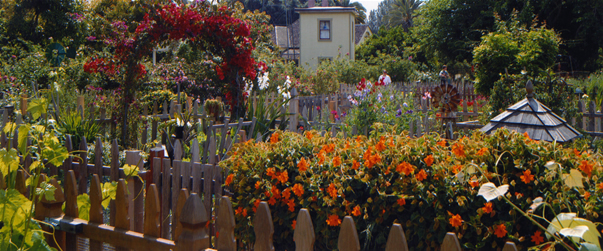Arboretum Showcases Plants of the World
The Fullerton Arboretum offers a retreat that takes visitors to faraway places through the world of plants
March 1, 2007
By Gail Matsunaga
An oasis amid the hustle and bustle of urban life, the Fullerton Arboretum offers a retreat with pathways that take visitors to faraway places through the world of plants: the Mediterranean, a redwood forest, the fall foliage of the Northeastern United States, palm trees, the desert and an old fashioned rose garden.
With its collection of more than 4,000 plants, this living museum, situated on 26 acres with ponds, streams and wildlife, helps visitors understand the diversity of plant life and the importance of protecting them, according to Greg Dyment, director of the arboretum.
Since opening in 1979, the arboretum has served as an ecological preserve, educational facility and recreational retreat.
At 8,537-square-feet, the packing house-inspired Visitor Center is the first “green” project at Cal State Fullerton and provides a glimpse into the possibilities for altering the approach to such areas as energy and water consumption, waste reduction, curriculum development and environmental management. It is maintained and managed by the Fullerton Arboretum Authority.
Anchoring the Visitor Center is the Orange County Agricultural and Nikkei Heritage Museum. Built with the help of funds raised by community leaders and donors from the county’s agricultural community, the museum honors the agricultural legacy of Orange County and the Japanese American community’s contributions to that chronicle. Presently showing is the inaugural exhibit, “Sowing Dreams, Cultivating Lives: Nikkei Farmers in Pre-World War II Orange County.”
A longtime attraction of the arboretum is Heritage House, the home of Fullerton’s first physician, which was saved from demolition and moved to the arboretum site in 1976. Originally built in 1894 in the Eastlake Victorian architectural style, the house is listed in the National Register of Historic Places and the Inventory of California Historic Sites. It serves as a public museum, preserving the history and cultural heritage of turn-of-the-century life in agricultural Orange County.
A variety of classes and workshops are available throughout the year at the Fullerton Arboretum. Upcoming offerings include:
* March 6: “Propagating California Natives”
* March 8: “Ikebana Workshop”
* March 10: “Junior Gardeners: Butterfly Garden”
* March 15-18: “Tomato Class” and “Monster Tomato and Pepper Sale”
* March 24: “Wildflower Field Trips”
* March 24-25: “Mission Indian Basketry Class”


 Produced by the Office of Public Affairs at California State University, Fullerton.
Produced by the Office of Public Affairs at California State University, Fullerton.